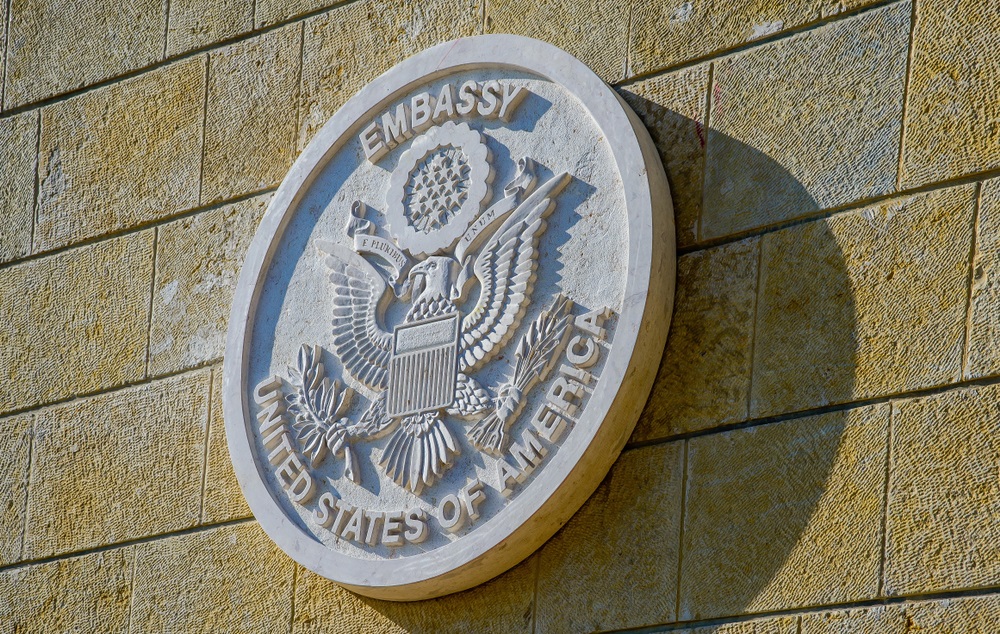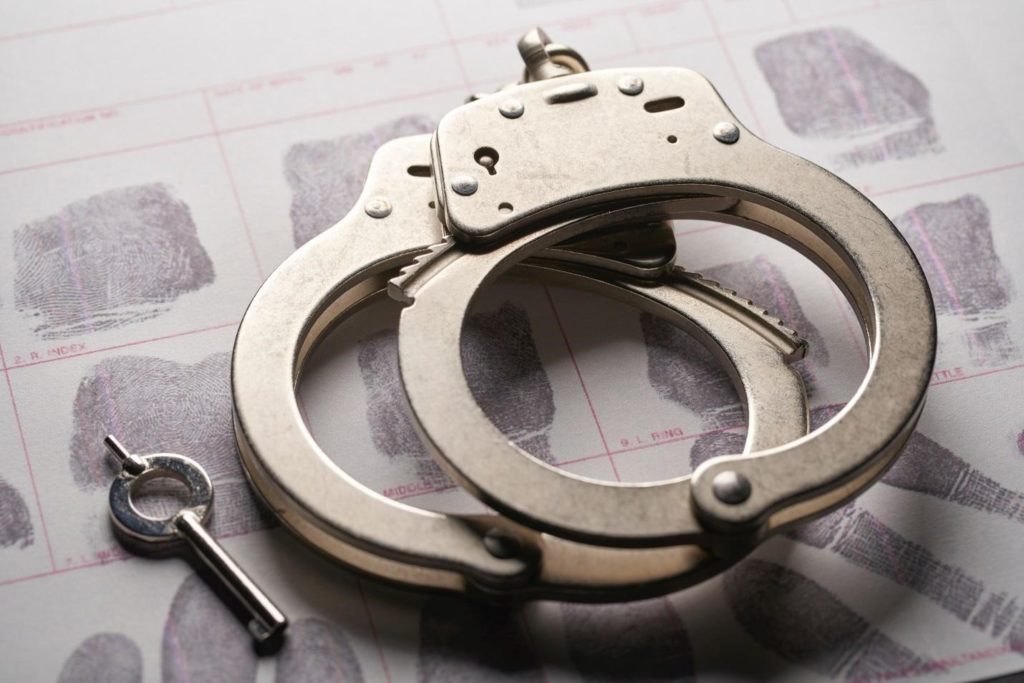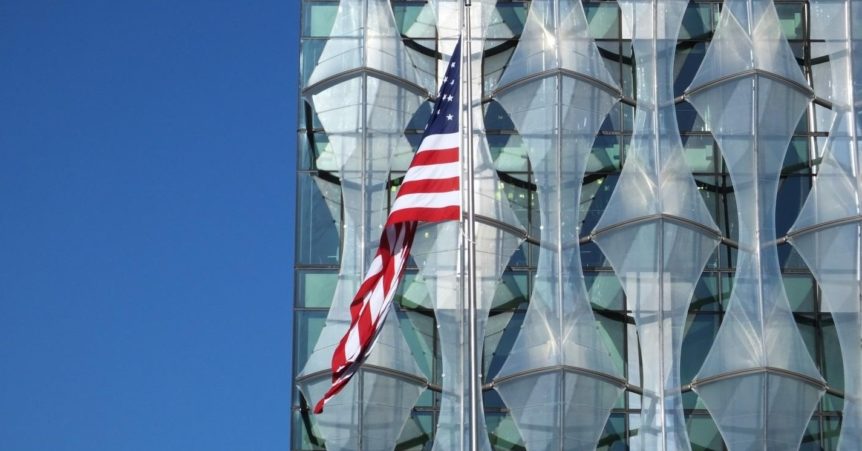Let’s say you and your friend are on holiday in Cancún. Your friend ends up making a slightly ill-advised decision and ends up becoming a “guest of the state.” You’ve tried your best to explain to the local police officers that your friend was not aware they were breaking the law when they committed the offense.
The friendly officers sympathize with you but explain there’s nothing more you can do for your friend. The law is the law; ignorance is not a defense. Your friend has to go through due process. They do, however, let you know that you can call your embassy for assistance.
There’s only one problem. The US Embassy is in Mexico City – a 2-hour flight from Cancún. There’s a US consulate agency nearby, but you’re not entirely sure they can help your friend. Consulate vs embassy – what’s the difference? Here’s everything you need to know.
What Is an Embassy
An embassy is a permanent diplomatic mission located in the capital city of a foreign country. For instance, the United States Embassy in Thailand is located in Bangkok. The US Embassy in Canada is situated in Ottawa, Ontario. The embassy in Mexico is located in the country’s capital Mexico City. Every country has, at most, one embassy.
Generally, if one country recognizes another as being a sovereign state, it establishes an embassy at the nation’s capital to preserve foreign relations between the two countries.
What Is the Purpose of an Embassy
What do embassies do? An embassy’s primary function is to offer assistance to US nationals traveling to or living in the host country. It is responsible for handling high-level diplomatic issues like negotiations and ensuring that the rights of its citizens are preserved.
Foreign Service Officers who work in the embassy are also responsible for interviewing citizens in the host country who wish to travel to the United States for tourism, education, or business purposes.
Embassy staff members interact with government representatives in the host country and non-governmental organizations, educational institutions, local businesses, and the media. They collaborate on shared interests, help shape policies, and increase local awareness and understanding of the United States.
Additionally, embassy staff personnel continuously monitor the economic and political climate in the host country and report back to the State Department, particularly on issues that may affect the United States. They may also work with the host country to train military and law enforcement personnel to improve security.
US embassies also work with US-based businesses to help them identify new markets and partners for growth. They also sponsor cultural, professional, and educational exchanges to promote and strengthen external ties between the US and foreign religious, political, and civil society figures, foreign scientists, academics, and students. They also work to introduce established and emerging leaders to the United States.
While US citizens work in US embassies abroad, the majority of the staff comes from the host country. These employees play a critical role in the embassy’s success since they are well-versed in the local culture and are well-connected to civil society leaders and government officials.

What Does an Ambassador Do?
An ambassador is the highest-ranking representative of the President in a foreign nation. They act as the chief spokesperson and diplomat for their home country. In the US, ambassadors to foreign nations receive their respective appointments from the President. They then have to be confirmed by the Senate before they can take up their diplomatic roles.
To be an effective ambassador, the appointed individuals need to be respected representatives of the US, resilient negotiators, and excellent managers. Some countries have 20+ federal agencies, all working in concert with embassy staff. They coordinate the activities of the staff and the Foreign Service Officers serving under them and those of the US agency representatives stationed in the host country.
Is There a US Embassy in Every Country
The United States has the second-highest number of diplomatic missions in the world after China. It has embassies in 166 out of the 193 United Nations (UN) member countries and representative offices in non-member countries, Taiwan and Kosovo. It also maintains an embassy to the Holy See in nearby Rome.
The Holy See is the Catholic Church’s central governing body and operates from Vatican City – a sovereign independent territory with the Pope as its head.
The US has an embassy in every country it recognizes as sovereign. While the country generally enjoys strong diplomatic ties to several foreign nations worldwide, there are four countries with which it does not work – North Korea, Syria, Iran, and Bhutan.
The country has never established formal relations with Bhutan and severed diplomatic ties with Syria shortly after the war broke out in 2012. Nonetheless, the United States can maintain varying degrees of informal contact with these countries via the nearby embassies in neighboring states.
Taiwan and Kosovo
Not many countries have an official diplomatic mission in Taiwan, mainly due to the uncertainty surrounding the country’s political status with regard to its relationship with the People’s Republic of China. As a result, the US, the UK, and several other countries don’t recognize Taiwan as a sovereign state since China claims it.
The US and the UK have unofficial representative offices in the country’s capital Taipei to provide assistance to foreign citizens, handle matters involving passports and visas, and maintain economic and cultural ties between the two countries. The American Institute and the British Trade Cultural Office are the two private entities representing US and UK interests in Taiwan.
As far as Kosovo goes, only 115 countries recognize it as sovereign, 23 of which have established embassies in the nation’s capital, Pristina. The United States is one of them, despite the fact that the country (Kosovo) is yet to achieve full member status at the UN.
Commonwealth Member Countries
Countries belonging to the Commonwealth of Nations, which consist primarily of former British colonies, don’t exchange ambassadors with other sovereign states. Instead, they have a High Commission.
In short, an embassy is a diplomatic mission sent to a non-Commonwealth country. A High Commission is a diplomatic mission sent to a Commonwealth member country.
Is US Embassy US Soil?
The short answer is no. This is one of the most common misconceptions about US embassies in other countries. Despite being physically located in a foreign nation, a US embassy does not constitute sovereign US territory.
Articles 22-25 of the Vienna Convention on Diplomatic Relations contain guidelines on how embassies work and how ambassadors and ambassadorial facilities should be treated. It also contains articles stating that an embassy is immune from disturbance, damage, or intrusion by the host country.
Nowhere in the text does it mention that the land on which an embassy is situated becomes the country’s sovereign territory. For instance, while the United States owns the property on which its embassy in Mexico is located, the land in question is still technically Mexican land.
This is further supported by a 1983 Ninth Circuit Court of Appeals ruling in McKeel v. The Islamic Republic of Iran. The court determined that the American Embassy located in the Iranian capital of Tehran was still a territory of Iran. Section 16 of the ruling reads, in part, that US embassies on foreign land remain the territory of the receiving countries. They are, therefore, not subject to US jurisdiction.
While foreign missions abroad enjoy special privileges and protections under international law, the land on which they are built is not the “soil” or territory of the country residing there.
Who Has Prosecutorial Jurisdiction Over a Crime Committed in an Embassy

Suppose someone committed a murder in the US Embassy in China. Who would have prosecutorial jurisdiction?
From a legal standpoint, the host country has jurisdiction and would be able to prosecute the crime. However, the provisions of the Vienna Convention provide immunity against “disturbance, damage, or intrusion” by the host country. This means that the embassy can technically refuse to grant entry to the local law enforcement officers, and it would not be illegal per se. It ultimately depends on the circumstances surrounding the crime.
If a top-ranking diplomatic officer committed the crime, they would enjoy full diplomatic immunity. This means they can’t be arrested, prosecuted, or forced to testify in a court of law. Full diplomatic immunity extends to their families and deputies.
Lower-ranking officials only have functional immunity, meaning they’re immune against crimes committed within the scope of their employment. If an embassy official was involved in criminal activity, say in a bar over the weekend, they can be arrested and prosecuted by the host country.
That being said, diplomatic immunity does have its limits. If a diplomat commits a crime in the host nation, the host nation can declare them a persona non grata and send them back to their home country. The home country can also decide to prosecute them for their crime and try them at a local court. In an egregious case, the diplomat’s home country may decide to waive the offending individual’s immunity to face prosecution in the host country.
If a local citizen of the host country committed the crime, they would be arrested, charged, and prosecuted in the local courts.
Committing a Crime in a Foreign Country – Can the US Embassy Help
Under international law, if a US citizen commits a crime in a foreign country, the foreign government is obligated to inform the US embassy of the arrest upon the request of the US national. The United States has also signed treaties with some countries requiring local authorities to notify the embassy of the arrest, whether or not the request is made.
Nonetheless, since the foreign country has prosecutorial jurisdiction, the embassy can only offer limited assistance to an arrested US national. A consular officer can visit the person in jail, provide them with a list of criminal attorneys, and ensure they aren’t mistreated at the hand of authorities. The officer may also get in touch with family or friends of the US citizen to let them know of the arrest if requested to do so.
If someone commits a crime overseas and then flies home, extradition treaties may allow the person to be extradited to the foreign country to face criminal prosecution. For extradition to occur, the offense has to be a crime in both countries.
What Is a Consulate
A consulate is essentially a compact version of an embassy. It is usually located outside a country’s capital, mainly in cities with a high tourist population. You can think of them as the “branch” offices of an embassy.
For instance, the US embassy in Germany is located in the country’s capital of Berlin. There are also US consulates stationed in cities like Munich, Hamburg, and Frankfurt. Mexico has consulates in Tijuana, Puerto Vallarta, Nuevo Laredo, Nogales, Monterrey, Hermosillo, Hermosillo and Merida.
What Is a Consulate General
A consulate general (also known as consul) is the chief diplomat in a consulate. They are in charge of consular districts and also oversee subordinate consular agencies within the host country.
What Does a Consulate Do
A consulate carries out similar official functions and provides the same services as an embassy. They follow the ambassador’s lead in engaging civil society, local governments, and other organizations to fulfill the Mission’s agenda. They take care of minor diplomatic issues including, taking care of expatriates, tourists, and migrants, supporting trade relationships, and issuing visas.
Consulates also provide critical services to resident US nationals or visiting American citizens in the host country, including birth registration and passport issuance. They work with local, foreign, and federal law enforcement agencies to curtail cross-border crime. They coordinate with the embassy to conduct exchanges, education, information, and commercial programs to identify new markets and partners for US companies to work with.
Do you have any legal questions for us? Chat online with a Laws101 attorney right now.
